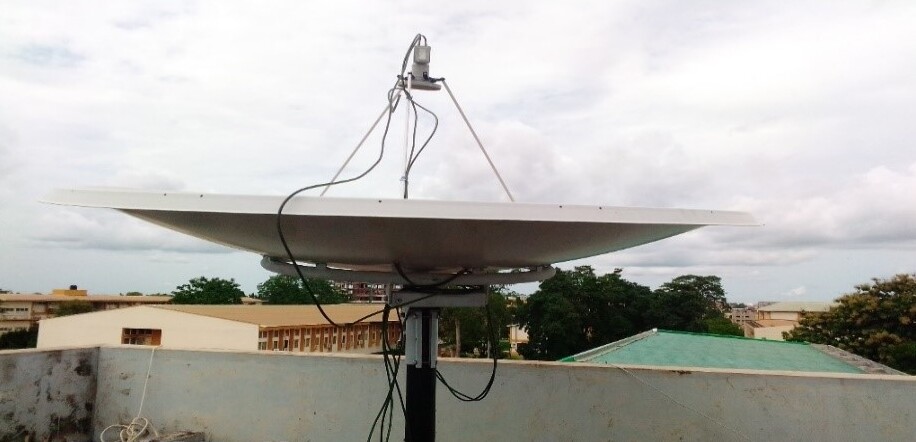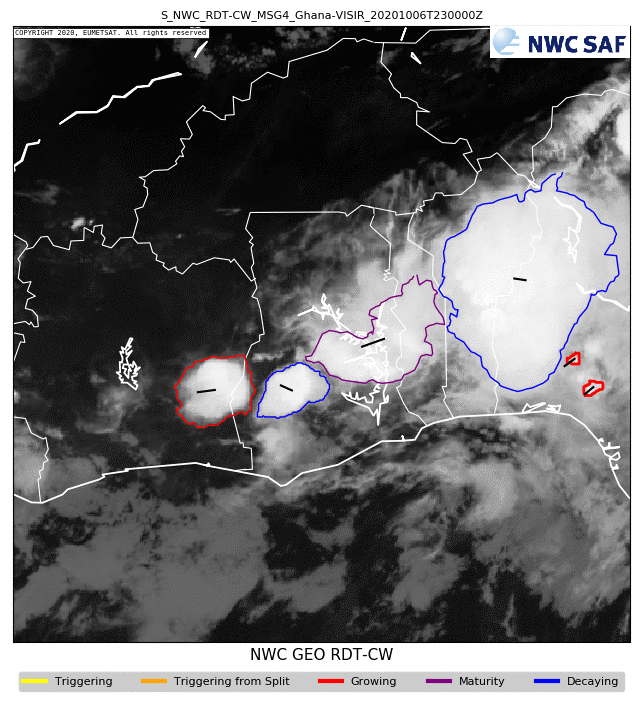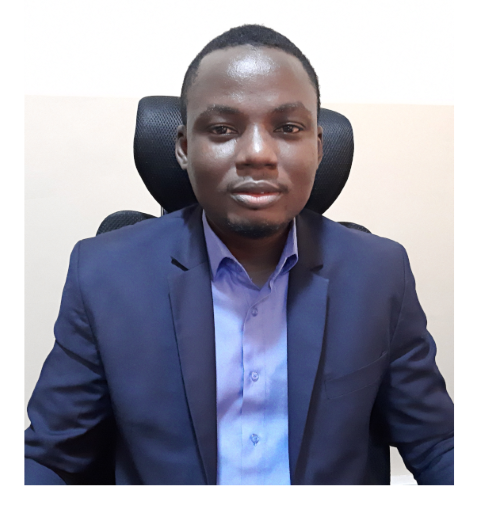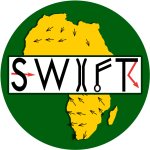By Dr. Jeffrey Nii Armah Aryee, Lecturer and Researcher at KNUST, Kumasi, Ghana
Accurate weather forecasting is an essential tool of modern society, which brings benefit to human safety and livelihoods, along with economic development and prosperity. The Nowcasting Satellite Facility (NWC-SAF) provides various products that are useful for improving nowcasting potential in Africa.
Ghana one of first African countries to operationalise real-time forecasting
As a science and technology-based institution with core mandate of providing realistic and applicable solutions to the many daunting societal challenges, Kwame Nkrumah University of Science and Technology (KNUST) prioritizes sound, impact-based research. Staff and students alike, translate their competencies in scientific programming and engineering to developing realistic solutions to the day-to-day challenges.
With the onset of the Global Challenges Research Fund – African Science for Weather Information and Forecasting Techniques (GCRF African SWIFT) project, the team – under the guidance of its strong and efficient management, and in tandem with the university’s strategic mandate to ensuring excellence in research and innovation – employed the best human resource capacity to undertake installation of the Nowcasting Satellite Facility (NWC-SAF) in the College of Science at KNUST. Currently, KNUST has access to real-time products from the NWC-SAF. More importantly, SWIFT has made this possible and seamless, through partnership between the UK and KNUST.

It is fulfilling to note that since 2008, the University of Leeds (Leeds, UK) has had partnership with KNUST and supported the establishment of the Meteorology and Climate Science programme. Beyond the establishment of the programme, the partnership has been continued and strengthened through many co-ordinated activities, with the current one being the GCRF African SWIFT project, targeted at improving the state of nowcasting in sub-Saharan Africa and addressing the challenges of predicting high-impact weather on timescales of 0 to 24 hours. These have strengthened the capacity of the programme, and are certainly key reasons why we have succeeded.
Nowcasting products improve early warnings for severe weather
The benefits of NWC-SAF in the sub-region include an improved early warning system which culminates into improving human life and advancing the adaptive and responsive capacities of stakeholders to severe weather events. With the operational run of the system on KNUST campus, the university community which forms our primary stakeholder group is bound to benefit from receiving real-time weather updates. Plans are underway to make the products available to the university community and surrounding communities via the university’s electronic billboard mounted on its campus and also through staff and student mailing lists.
With the Ghana Meteorological Agency (GMet) mandated as the sole agency with rights to issue weather forecasts and provide weather updates in Ghana, KNUST will liaise with GMet under the framework of their existing MoU and the SWIFT project to disseminate the forecast products within the university community and other surrounding communities in the Ashanti Region.

Providing an efficient and effective early warning system is a nationwide challenge. KNUST has outlined plans to support GMet in getting NWC-SAF functional within their institution to support operational forecasting activities. The long-lasting partnership between KNUST and GMet allows for shared resources and competencies. As such, the fruitful installation and functioning of NWC-SAF in GMet will advance research collaborations and knowledge-sharing to improve on forecast provision to the country. This is geared towards improving general livelihood and increasing citizen trust in issued forecasts and will serve as a solution to the challenges of predicting high-impact weather on short timescales.
The partnership will also support maintenance and upgrade of the system as an African solution. Going forward, both institutions will adopt a means that allows for issued forecasts to reach their target stakeholders, even in remote locations.
SWIFT plans to operationalise nowcasting in more African countries
As the technical lead on the NWC-SAF installation in Ghana, I have enjoyed working with the wider network of scientists from the UK and Africa, who continue to contribute their various skills of expertise to advance research on the continent. The NWC-SAF installation and operational run, despite being new to me, were worthwhile challenges which I embraced. They have definitely been great avenues for learning new things.
I am glad that the partnership and shared ideas by the UK and Ghana team have helped in fruitfully operationalizing the system in the country. With similar collaborations, the system should be functional in other institutions across the continent. I look forward to seeing the NWC-SAF products feature greatly in research works by African scientists, as well as operational forecasts by the various meteorological agencies across the continent.
About the Author

Dr. Jeffrey Nii Armah Aryee is a lecturer and researcher at the Kwame Nkrumah University of Science and Technology (KNUST), Kumasi, Ghana. Within the African SWIFT project, he is the scientist responsible for the Nowcasting Satellite Facility (NWCSAF) operation in Kumasi, Ghana. Prior to his engagement on the African SWIFT project, Dr. Jeffrey N. A. Aryee was involved in the DACCIWA (Dynamics-Aerosol-Chemistry-Cloud Interactions in West Africa) project, where his primary research centered on Boundary Layer Dynamics in southern West Africa.
